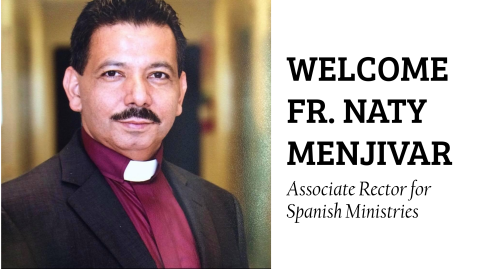TLDR: Lent is a season to prepare for the celebration of Christ’s passion, death, and resurrection. It is a time of meditation, reflection, self-assessment, and “Spring cleaning.” Read on for more.
The 2024 Epiphany season has gone by quickly and we are now less than two weeks away from Lent. As you remember, Epiphany is the season of manifestation or appearance, where each Sunday seeks to reveal an important truth about Jesus of Nazareth. Lent, on the other hand, is a season of forty days, in which believers prepare for the celebration of the holy events of Christ’s passion, death, and resurrection. It is a time of meditation, reflection, self-assessment, and “Spring cleaning.” We identify the many ways in which our behavior separates us from each other and God, and we seek to amend our lives. In the Anglican tradition, this self-assessment takes place within the context of prayer, special liturgies (Ash Wednesday, Stations of the Cross, Maundy Thursday, Good Friday, etc.,) acts of piety (fasting, prayers, deprivation [given something up,] etc.,) and the sacrament of confession, both general confession during church services and auricular confession with a priest.)
The scriptural readings and Collects of this season seek to aid the believer to identify those areas in need of change. On Ash Wednesday, we ask that God may “Create and make in us new and contrite hearts.” This petition acknowledges that our hearts sometimes get fixed because of our sin nature, many of us have hearts of stone. The prayer asks for hearts of flesh that are able to repent of their sins and ask God for forgiveness. On the first Sunday of Lent, we ask God to “Come quickly to help us who are assaulted by many temptations” and to “Let each one find you mighty to save.” We ask this because only God “know(s) the weaknesses of each of us.” These many temptations range from discouragement to outright lack of faith. But they also include interpersonal conflicts that threaten our peace, financial reversals that send us into shame spirals, daily temptations to use and abuse others for our benefit, lack of strength to withstand all types of addictions, and unbridled desires for self-directed behaviors.
On the second Sunday of Lent, we ask God to “Be gracious to all who have gone astray from your ways, and bring them again with penitent hearts and steadfast faith to embrace and hold fast the unchangeable truth of your Word, Jesus Christ your Son.” The focus is on those who have abandoned the faith, those whose faith has cooled off and now doubt God’s existence, and those for whom God is irrelevant to their lives. The prayer asks for them to have penitent hearts and to return to Jesus Christ. Many of us have known Christians who have abandoned the faith because they were hurt by a minister or priest, or by another member of the church. This is the day to pray for forgiveness if we have driven others out. This is the time to ask God to heal the hearts of those who have been abused, that they may return to the one who loves them and cares for them.
On the third Sunday, we ask God to “Keep us both outwardly in our bodies and inwardly in our souls.” The reason for this prayer is “that we may be defended from all adversities which may happen to the body, and from all evil thoughts which may assault and hurt the soul.” I love that this prayer refuses any dualism and accepts that both our bodies and our souls are equally in danger. The outward assaults could be illnesses, conflicts, violence, food insecurity, etc. Internal processes hurt our souls and make us less of what we are called to be. These can be self-deprecatory statements, all-consuming anger at ourselves or others, fears and anxiety, intrusive thoughts that rob us of our tranquility, etc. God is the only one who can help us.
On the fourth Sunday of Lent, we will ask God to “Evermore give us this bread which gives life to the world.” The Collect says that this bread is none other than Jesus Christ, God’s blessed Son. We need this bread, “that he may live in us, and we in him.” This prayer rightly acknowledges that we need a deeper relationship with Jesus, who is the true bread from heaven. I love the Eucharistic echoes in this prayer, although it’s reach is much wider than the Eucharist. Ultimately, this prayer is about a relationship with Jesus.
Finally, on the fifth Sunday of Lent we ask God to “Grant your people grace to love what you command and desire what you promise.” We need grace to truly obey God’s call for our lives and to love that call. There is a proverb that claims, “Love what you do and you will never work a day in your life.” I don’t believe this prayer is saying this. Even if we love God’s call for our lives, things will be hard from time to time. It takes a lot of courage to be civil in an uncivil world, to be loving in an unloving time, to be kind in an unkind country. We need God’s grace to remain faithful even in the face of opposition and daily challenges. We live in a competitive world where to win you must destroy completely the other. Being a Christian requires an ethic of love and acceptance. Without God’s grace this is virtually impossible.
I pray you have a holy and reflective Lent. Please remember that the clergy of Saint Dunstan’s will remain available for prayer and the sacramental action of confession.
Blessings to you and yours,
Fr. Roman+





